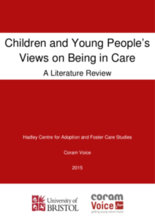Displaying 1041 - 1050 of 1171
In this article, Harry Stevenson, President of Social Work Scotland, writes about the connection between poverty and child protection.
This opinion piece by Harvey Gallagher, Chief executive of the Nationwide Association of Fostering Providers, argues the need for a “ re-think to rid ourselves of outdated notions” when it comes to foster care in the UK.
The Labour government in the UK will announce a new plan to improve child protection policies, according to this article from the Guardian.
Tristram Hunt, shadow education secretary in the UK, will be announcing a series of new measures to support children and families, including offering new “kinship rights” to children in the care of their siblings, grandparents, or other relatives.
This paper discusses and examines the lessons learned from the Munro Review relevant for looked after children. The Munro Review provides an analysis of the current state of the child protection system, challenging bureaucratised practice and arguing for a reclaiming of professional social work identity, knowledge and understanding.
The government of the U.K. is considering new legislation that would permit children to remain in residential care until the age of 21, says this article from Community Care.
A child in the UK was removed from his parents’ custody nine months prior to the publication of this article.
In this article, author Natasha Phillips writes about the past year in child welfare law in the United Kingdom and the expected reforms for 2015.
This booklet has been designed to help local authorities, schools and their partners work together to ensure they can provide every child, including looked after children, with the kind of positive learning experience which is the foundation for future success.
This literature review highlights the voices of looked after children in the UK from existing research, on their journey through the care system.


